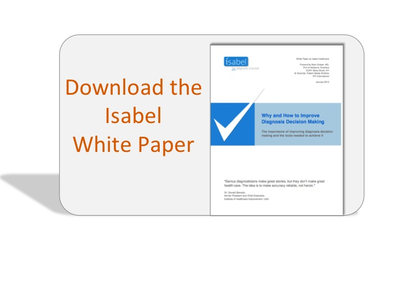- Privacy Policy
- Terms & Conditions
- Contact us
- ©Isabel Healthcare 2025
Antibiotic Resistance and Diagnosis Error | 1 Minute Read
What is Antimicrobial Resistance (AMR)?
 Antibiotics and similar drugs are antimicrobial agents, and have been used for the past 70 years to treat patients with a variety of infectious diseases. These drugs have greatly reduced illness and death from infectious diseases. Due to the wide, prolonged and often inappropriate use of these drugs we now face a greater problem of antimicrobial resistance. This is where the infectious organisms that the antibiotics are designed to kill have adapted themselves, making the drugs less effective.
Antibiotics and similar drugs are antimicrobial agents, and have been used for the past 70 years to treat patients with a variety of infectious diseases. These drugs have greatly reduced illness and death from infectious diseases. Due to the wide, prolonged and often inappropriate use of these drugs we now face a greater problem of antimicrobial resistance. This is where the infectious organisms that the antibiotics are designed to kill have adapted themselves, making the drugs less effective.
Each year in the United States, the Centers for Disease Control and Prevention (CDC) state that 2 million people become infected with bacteria that are resistant to antibiotics, and at least 23,000 people die each year as a result of these infections. In Europe, 25,000 people die each year from infections due to five antibiotic-resistant bacteria.
Key Facts – Antimicrobial Resistance and its Effects
In some countries, over 60% of Staphylococcus aureus cases in hospital Intensive Care Units (ICUs) are now resistant to first-line antibiotics, including methicillin, oxacillin, penicillin and amoxicillin. 20-30% of extended-spectrum beta-lactamase (ESBL) infections in United States ICUs now involve strains which cannot be treated by third-generation cephalosporins.
The loss of effective antibiotics undermines the ability to fight Infectious diseases and manage complications in vulnerable patients undergoing chemotherapy for cancer, dialysis for kidney failure or those who require organ transplantation. These patients in an already immunocompromised state need to have antibiotics as weapons in order to fight secondary infections which arise due to their treatment.
When first line and second line treatment options are limited by not being available or due to resistance, healthcare providers have no option but to use alternative antibiotics which are more toxic to the patient, frequently less effective and more expensive. Research has shown that patients with resistant infections are often more likely to die, have longer hospital stays, delayed recuperation and long-term disability.
The link between Antimicrobial Resistance and Diagnostic Error
A new retrospective cohort study at Minneapolis Veterans Affairs Medical Center (MVAMC) published online this week in Infection Control & Hospital Epidemiology, (the journal of the Society for Healthcare Epidemiology of America) shows that diagnosis error lead to an increased risk of incorrect antibiotic use which threatened patient outcomes, antimicrobial efficiency and an associated increase in healthcare costs.
The study evaluated 500 inpatient cases and determined whether the initial diagnoses were correct, indeterminate, incorrect, or a sign/symptom consistent with an infectious disease rather than a specific disease diagnosis, and then deduced whether the antimicrobial course prescribed was appropriate.
The results found 95% of patients with an incorrect/indeterminate diagnosis, or with a symptom identified but no diagnosis, were given inappropriate antibiotics. 38% of patients who received a correct diagnosis were incorrectly given antibiotics. Overall, 58% received a correct diagnosis which shows that diagnosis error and rates of misdiagnosis are higher in this study compared to other studies on diagnostic error unrelated to the use of antimicrobials.
The researchers analysed the contributing factors leading to inaccurate diagnosis and inappropriate antibiotic use as:
-
Healthcare workers relying on intuitive rather than analytical processes which are more reliable, safe and effective,
-
Cognitive overload, sleep deprivation and fatigue
-
Receiving a patient with a previous diagnosis from another provider rather than reworking the patient up using their own skills and knowledge
-
Lack of clinical experience with adverse drug effects
-
Contributing factors which the researchers said may lead to inaccurate diagnosis and inappropriate antibiotic use include:
Greg Filice, MD who is the lead author of the study stated:
"Antibiotic therapies are used for approximately 56 percent of inpatients in U.S. hospitals, but are found to be inappropriate in nearly half of these cases, and many of these failures are connected with inaccurate diagnoses….. Diagnostic accuracy is integral to the safe use of antibiotics. In order to improve the use of antibiotics in healthcare, we must consider this challenge and look for tools and strategies that help clinicians decrease unnecessary and potentially harmful antibiotic use.”
Antibiotic Stewardship: Way forward with Clinical Decision Support
Filice also said: “The findings suggest that antimicrobial stewardship programs could be more impactful if they were designed to help providers make accurate initial diagnoses and to know when antibiotics can be safely withheld."
Antibiotic stewardship is encouraging health professionals around the world to adopt the principles of responsible antibiotic use. It is a commitment to always use antibiotics only when they are necessary to treat and in some cases prevent disease, to choose the right antibiotics and administer them in the correct way in every case.
It has become all too common for patients meeting their health care provider in a 10 minute GP consultation or presenting to the ER with a fever to leave with a prescription for antibiotics when in most cases the cause of the patient’s symptoms are viral rather than bacterial so the antibiotics won’t help the patient. It if is their first consultation, advice on managing the symptoms using pain relief, fever control and asking them to return if their symptoms worsen may be more appropriate. Patients could also become more knowledgeable about their symptoms by using symptom checkers and engaging with their health provider on whether antibiotics are the most effective course of treatment for their current symptoms.
A similar pattern can be seen with patients admitted to wards, and where tests have to be run and an accurate history built up. Clinical decision support tools are there to help work up the signs, symptoms and test results into formulating a differential diagnosis and with support from evidenced based literature, a Physician can decide if antibiotics are appropriate and the correct dosage can be deployed in order to give the patient the best possible outcome. Re-examining the patient on a regular basis, monitoring their charts and reviewing test results will then help narrow the differential diagnosis until the final diagnosis is made.
Effective antibiotic stewardship ensures every patient gets the maximum benefit from antibiotics, avoids unnecessary harm from allergic reactions and side effects, saves pharmacy costs and fundamentally helps preserve the life-saving potential of these drugs for the future. Many research studies on diagnosis error conclude that Clinicians should have produced a differential diagnosis when evaluating the patient. Isabel is a practical decision support tool to help generate the differential diagnosis required and tailor the medications correctly to support the differential diagnosis.
*EDCD/EMEA Joint Technical Report. The bacterial challenge: time to react. 2009 EMEA/576176/2009
Did you know we have apps for our Diagnosis Tool and Symptom Checker? Now it's even easier to use our tools on the go!
Download our whitepaper on Diagnosis Decision Making:
Photo attribution:

Mandy Tomlinson
Mandy has worked for Isabel Healthcare since 2000. Prior to this, she was a Senior Staff Nurse on the Pediatric Infectious disease ward and high dependency unit at one of London's top hospitals, St Mary’s in Paddington which is part of Imperial College Healthcare NHS Trust. Her experience in the healthcare industry for the past 33 years in both the UK and USA means she's a vital resource for our organization. Mandy currently lives and works in Scottsdale, Arizona.
Subscribe Here!
Recent Posts
Isabel DDx Companion with ChatGPT Integration - to help you diagnose even faster
At Isabel Healthcare, we’ve always been driven by one goal: to make clinical reasoning faster,..Virtual Triage: Do more questions lead to better patient outcomes?
One of the common misconceptions related to virtual triage / symptom checker tools is that the more..List Of Categories
- Differential Diagnosis Decision Support
- Differential diagnosis
- Symptom Checker
- Symptoms
- Medical Error
- Patient Disease Information
- Disease
- Clinical Decision Support
- Diagnostic Decision Support
- Isabel 1 Minute Read
- Diagnosis Error
- Diagnosis Skills Cases
- Healthcare Informatics
- Clinical Reasoning
- Evidence-based Medicine
- Medical Education
- Patient Engagement
- Symptom Triage
- Nurse Practitioner Education
- Nursing Decision Support
- Partnership
- Public Health
- COVID-19
- EHR
- Patient Empowerment
- Patient Safety
- rare disease

Start your FREE Trial today
Try the Isabel Pro DDx generator for 30-days - no payment card details required.





